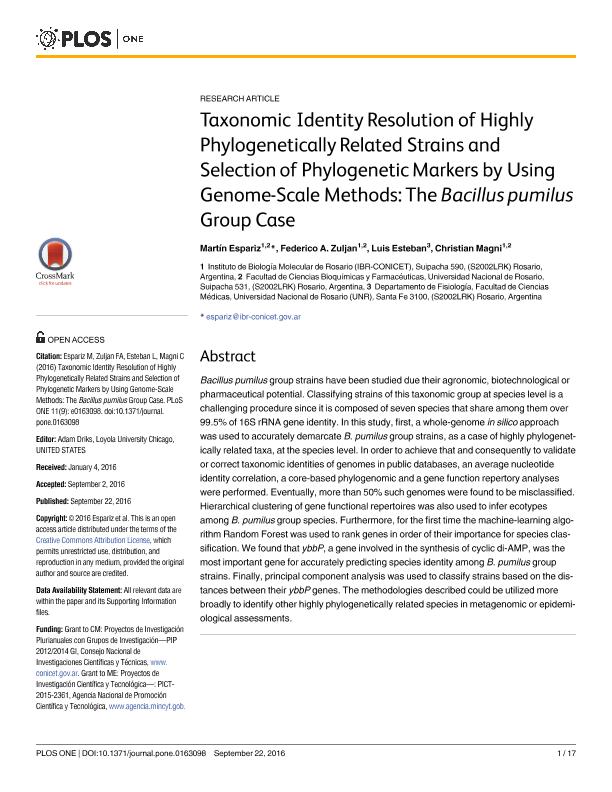Artículo
Taxonomic identity resolution of highly phylogenetically related strains and selection of phylogenetic markers by using genome-scale methods: The bacillus pumilus group case
Fecha de publicación:
09/2016
Editorial:
Public Library of Science
Revista:
Plos One
ISSN:
1932-6203
Idioma:
Inglés
Tipo de recurso:
Artículo publicado
Clasificación temática:
Resumen
Bacillus pumilus group strains have been studied due their agronomic, biotechnological or pharmaceutical potential. Classifying strains of this taxonomic group at species level is a challenging procedure since it is composed of seven species that share among them over 99.5% of 16S rRNA gene identity. In this study, first, a whole-genome in silico approach was used to accurately demarcate B. pumilus group strains, as a case of highly phylogenetically related taxa, at the species level. In order to achieve that and consequently to validate or correct taxonomic identities of genomes in public databases, an average nucleotide identity correlation, a core-based phylogenomic and a gene function repertory analyses were performed. Eventually, more than 50% such genomes were found to be misclassified. Hierarchical clustering of gene functional repertoires was also used to infer ecotypes among B. pumilus group species. Furthermore, for the first time the machine-learning algorithm Random Forest was used to rank genes in order of their importance for species classification. We found that ybbP, a gene involved in the synthesis of cyclic di-AMP, was the most important gene for accurately predicting species identity among B. pumilus group strains. Finally, principal component analysis was used to classify strains based on the distances between their ybbP genes. The methodologies described could be utilized more broadly to identify other highly phylogenetically related species in metagenomic or epidemiological assessments.
Palabras clave:
B. Pumilus
,
Randomforests
,
Taxonomic Resulution
Archivos asociados
Licencia
Identificadores
Colecciones
Articulos(IBR)
Articulos de INST.DE BIOLOGIA MOLECULAR Y CELULAR DE ROSARIO
Articulos de INST.DE BIOLOGIA MOLECULAR Y CELULAR DE ROSARIO
Citación
Espariz, Martin; Zuljan, Federico Alberto; Esteban, Luis; Magni, Christian; Taxonomic identity resolution of highly phylogenetically related strains and selection of phylogenetic markers by using genome-scale methods: The bacillus pumilus group case; Public Library of Science; Plos One; 11; 9; 9-2016; 1-17; e0163098
Compartir
Altmétricas




